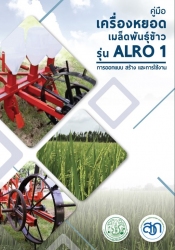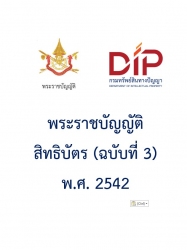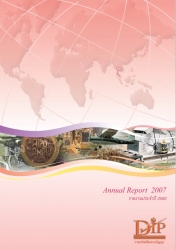
Author : กรมทรัพย์สินทางปัญญา
Publishing Date : Feb 07, 2023
รายงานประจำปี กรมทรัพย์สินทางปัญญา ปี 2550
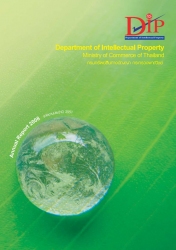
Author : กรมทรัพย์สินทางปัญญา
Publishing Date : Feb 07, 2023
รายงานประจำปี กรมทรัพย์สินทางปัญญา ปี 2551

Author : กรมทรัพย์สินทางปัญญา
Publishing Date : Feb 07, 2023
รายงานประจำปี กรมทรัพย์สินทางปัญญา ปี 2553
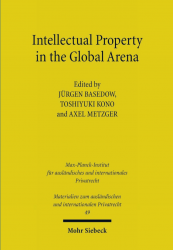
Author : Kono, Toshiyuki; Basedow, Jürgen; Metzger, Axel
Publishing Date : Mar 20, 2023
The private international law of intellectual property is currently much debated both in Europe and abroad. Art. 8 of the Rome II Regulation of 2007, which codifies a territorial approach for the infringement of intellectual property, has provoked an intensive discussion in Europe as to whether the lex loci protection is still appropriate for intellectual property litigation in the age of worldwide networks. A condensed outcome of this debate is summarized in the »Principles for Conflict of Laws in Intellectual Property« (CLIP Principles) drafted by the European Max Planck Group on Conflict of Laws in Intellectual Property (CLIP), published recently in a second preliminary draft. On the international scale, the American Law Institute's »Intellectual Property: Principles Governing Jurisdiction, Choice of Law, and Judgments in Transnational Disputes« of 2007 (ALI Principles) are the focal point of the debate. A Japanese project (»Transparency Proposal«) was finalized in 2009. This volume provides a comparative analysis of the three proposals. It compiles papers presented at an international conference held in Tokyo in May 2009.
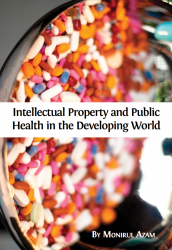
Author : Azam, Monirul
Publishing Date : Mar 20, 2023
"Across the world, developing countries are attempting to balance the international standards of intellectual property concerning pharmaceutical patents against the urgent need for accessible and affordable medicines. In this timely and necessary book, Monirul Azam examines the attempts of several developing countries to walk this fine line. He evaluates the experiences of Brazil, China, India, and South Africa for lessons to guide Bangladesh and developing nations everywhere. Azam's legal expertise, concern for public welfare, and compelling grasp of principal case studies make Intellectual Property and Public Health in the Developing World a definitive work. The developing world is striving to meet the requirements of the World Trade Organization's TRIPS Agreement on intellectual property. This book sets out with lucidity and insight the background of the TRIPS Agreement and its implications for pharmaceutical patents, the consequences for developing countries, and the efforts of certain representative nations to comply with international stipulations while still maintaining local industry and public health. Azam then brings the weight of this research to bear on the particular case of Bangladesh, offering a number of specific policy recommendations for the Bangladeshi government—and for governments the world over. Intellectual Property and Public Health in the Developing World is a must-read for public policy-makers, academics and students, non-governmental organizations, and readers everywhere who are interested in making sure that developing nations meet the health care needs of their people. "
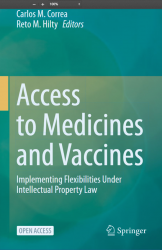
Author : Correa, Carlos M., Hilty, Reto M.
Publishing Date : Mar 20, 2023
This open access book is the outcome of a Global Forum on Innovation, Intellectual Property and Access to Medicines held in December 2019 at the Max Plank Instititute in Munich, organised by the South Centre and the Max Plank Institute. The academics and experts from international organisations participating have contributed chapters to this book. The book is for policy makers (in Ministries of Health, Ministries of Trade, Ministries of Foreign Affairs, patent offices), but also relevant for academics (law, trade, public health), on the flexibilities available in the Agreement on Trade Related Aspects of Intellectual Property Rights (TRIPS) of the World Trade Organization to promote access to medicines.
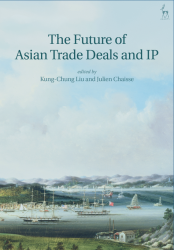
Author : Liu, Kung-Chung; Chaisse, Julien
Publishing Date : Mar 20, 2023
The first part of this open access book sets out to re-examine some basic principles of trade negotiation, such as choosing the right representatives to negotiate and enhancing transparency as a cure to the public’s distrust against trade talks. Moreover, it analyses how the Comprehensive and Progressive Agreement for the Trans-Pacific Partnership (CPTPP) might impact on the Regional Comprehensive Economic Partnership's (RCEP) IP chapter and examines the possible norm setters of Asian IP. It then focuses on the People's Republic of China's (PRC) trade and IP strategy against the backdrop of the power games between the PRC, India and the US. The second part of the book reflects on issues related to investor–state dispute settlement and its relationship with IP, such as how to re-calibrate the balance in international investment arbitration, and whether compulsory license of IP constitutes expropriation in India, the PRC and select ASEAN countries. The third part of the book questions and strives to improve some of the proposed IP provisions of CPTPP and RCEP and to redefine some aspects of international IP norms, such as: pre-grant patent opposition and experimental use exception; patent term extension; patent linkage and data exclusivity for the pharmaceutical sector; plant variety protection; pre-established damages for copyright infringement; and the restructuring of copyright limitations in the public interest. The open access edition of this book is available under a CC BY-NC-ND 3.0 licence on bloomsburycollections.com. Open access was funded by the Applied Research Centre for Intellectual Assets and the Law in Asia, School of Law, Singapore Management University.

Author : Velásquez, Germán
Publishing Date : Mar 22, 2023
This open access book is a collection of research papers on COVID-19 by Germán Velásquez from 2020 and early 2021 that help to answer the question: How can an agency like the World Health Organization (WHO) be given a stronger voice to exercise authority and leadership? The considerable health, economic and social challenges that the world faced at the beginning of 2020 with COVID-19 continued and worsened in many parts of the world in the second-half of 2020 and into 2021. Many of these countries and nations wanted to explore COVID-19 on their own, sometimes without listening to the main international health bodies such as WHO, an agency of the United Nations system with long-standing experience and vast knowledge at the global level and of which all countries in the world are members. In this single volume, the chapters present the progress of thinking and debate — particularly in relation to drugs and vaccines — that would enable a response to the COVID-19 pandemic or to subsequent crises that may arise. Among the topics covered: COVID-19 Vaccines: Between Ethics, Health and Economics Medicines and Intellectual Property: 10 Years of the WHO Global Strategy Re-thinking Global and Local Manufacturing of Medical Products After COVID-19 Rethinking R&D for Pharmaceutical Products After the Novel Coronavirus COVID-19 Shock Intellectual Property and Access to Medicines and Vaccines The World Health Organization Reforms in the Time of COVID-19 Vaccines, Medicines and COVID-19: How Can WHO Be Given a Stronger Voice? is essential reading for negotiators from the 194 member countries of the World Health Organization (WHO); World Trade Organization (WTO) and World Intellectual Property Organization (WIPO) staff participating in these negotiations; academics and students of public health, medicine, health sciences, law, sociology and political science; and intergovernmental organizations and non-governmental organizations that follow the issue of access to treatments and vaccines for COVID-19.
Author : สถาบันทรัพย์สินทางปัญยาแห่งจุฬาลงกรณ์มหาวิทยาลัย
Publishing Date : Dec 03, 2018
หนังสือรายงานการวิเคราะห์แนวโน้มเทคโนโลยีและอุตสาหกรรม "อุตสาหกรรมยานยนต์ใหม่"
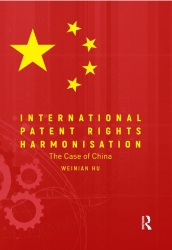
Author : Weinian Hu
Publishing Date : May 08, 2017
With reference to China, this book examines the course of international patent rights harmonisation; its characteristics as well as impediments. It evaluates the case of China’s patent law development over the course of the last three decades by drawing on the most up-to-date Chinese language sources. In the process, the volume focuses on China’s patent legislation, its achievements and weaknesses, as well as the intrinsic limitations, especially as far as enforcement is concerned. The author pays close attention to the unique societal background in China, a country that did not provide constitutional recognition to private property rights until 2004 and where a property law entered into force as late as 2013, 30 years after the first promulgation of the patent law.
Global trade policy makers, IP professionals and businesses will benefit from the insights presented by the chapters as they will help them to appreciate the achievements and the controversies pursuant to China’s efforts in patent protection. While serving as a useful case study for countries seeking to leverage patent protection as a driver for economic development, the book will equally facilitate Chinese legislature to reflect on its patent legislation development, specifically on legislative policy choices.
An additional analytical strength of the volume is that it compares the Chinese patent legislation with the American Invents Act and the European Patent Convention. It discovers the differences between the three patent legislations by using the minimum patent protection standards set down by the TRIPS Agreement as the benchmark. The results of the comparisons suggest that China has successfully harmonised its patent legislation with the global patent protection system, and often opts for higher patent protection standards. The book also considers whether China could learn lessons from Japan and India in their respective patent legislation and policy choices.
With China undertaking a fourth patent law amendment, the provisions contained in the second draft of the Patent Law 2015, which was published in December 2015, are included in the analysis.
123NextLast

